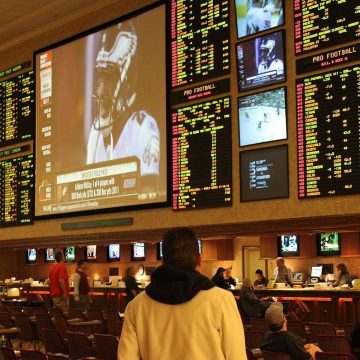
A “perfect storm is aligning” to end America’s 25-year old federal ban on sports betting, according to American Gaming Association (AGA) CEO Geoff Freeman. The AGA recently launched an all-inclusive advocacy campaign to champion the legalization of sports betting in the United States.
That advocacy group is called the American Sports Betting Coalition (ASBC). The group’s membership includes powerful political caucuses like the National Conference of State Legislatures and the National Conference of Mayors. Influential nationwide U.S. law enforcement associations like the National District Attorneys Association, the Major County Sheriffs Assocition, and the Fraternal Order of Police also have joined the ASBC.
Geoff Freeman: “Now Is the Time to Repeal”
Geoff Freeman said, “The ASBC will engage stakeholders, lawmakers, allies and fans in pursuit of repealing PASPA. The AGA believes a perfect storm is aligning, and now is the time to repeal this failing law.”
The mood is right among the American people for a repeal of sports betting. The AGA commissioned a survey recently that showed nearly 60% of Americans and 72% of U.S. sports fans favor an end to the federal ban on sports gambling.
Benefits of Legal Sports Betting
Statistics show that legal sports betting would benefit state and county-level administrations, too. In announcing the formation of the ASBC, Geoff Freeman noted a recent study by Oxford Economics on the economic benefits of federally legalized sports betting in the United States. Repealing the the 25-year old Professional and Amateur Sports Protection Act (PASPA) would create 152,000 new jobs in the United States, while tapping an estimated $26 billion in untapped economic output.
PASPA repeal would create up to $5.2 billion in annual tax revenuesd for the states. Meanwhile, ending the federal ban would curb the $150 billion-a-year illegal sports betting industry in the United States. That industry includes individual illegal bookmakers (“bookies”) and illegal offshore sportsbooks and sports betting exchanges.
Failure of the PASPA Federal Ban
Freeman says the AGA’s Illegal Gambling Advisory Board is working with the aforementioned ASBC members to call for an end of PASPA. The federal ban on sports betting was championed by US sports associations to end all legal sports betting in America, but after a staunch lobbying effort on the part of 4 states (led by Nevada), the bill eventually banned sportsbooks in 46 US states.
After a quarter-century as the official law of the land, PASPA is an obvious and notable failure, according to the AGA’s chief executive.
Freeman said, “America’s 25-year-old federal ban on sports betting has failed. That’s why a new diverse coalition including law enforcement, elected officials, and gaming leaders is coming together to reform the law.”
“Let’s face it, despite PASPA’s presence, millions of Americans bet at will in a vast unregulated illegal market that offers no oversight by law enforcement, no accountability to regulators, no protections for consumers, and no concern about the integrity of games.”
US Law Enforcement Supports Legal Sports Betting
The inclusion of so many law enforcement associations and civic leadership groups shows is a sign that PASPA has failed, the AGA president asserts. Like the Volstead Act during the Prohibition Era’s ban on alcohol, PASPA’s goal of ending sports betting has proven beyond America’s law enforcement and prosecutorial agencies’ ability to enforce. Americans want to gamble on sports, so they have found ways to circumvent the law.
The attempt to ban sports gambling has cost U.S. states countless billions of dollars in tax revenues. Freeman noted the starkest examples in his press release on the ASBC’s creation. Freeman noted, “For example, in the two biggest sports events of the year, the Super Bowl and the NCAA men’s basketball tournament, American’s wagered nearly $15 billion – 97% of that wagering was illegal.”
District attorney offices and sheriff’s departments throughout the land countless work hours and resources which could have been spent on other, more serious crime enforcement. State legislatures have passed many pro-gambling laws to raise tax revenues in their states, though they have been unable to legalize and regulate sportsbooks, which would have enhanced the revenue streams of local casinos and racinos — and boosted tax revenues.
Reasons a Sports Betting Ban Is Outdated
In the 25 years since PAPSA was passed, the sports betting industry has changed. Potential American sports bettors can go on the Internet to online sportsbooks, racebooks, and sports betting exchanges to gamble on their favorite sporting events. The invention of the mobile smartphone means sports gamblers can make bets on any major sporting event or prop bet in the world anywhere they are — but all in an unlicensed, unprotected gaming market.
Reasons the American Sports Betting Coalition (ASBC) Is Needed
Gone are the days when a “sports protection act” could ban legal sportsbooks and provide even a semblance of protection to sports associations — or to an avid gambling public. Law enforcement officials, lawmakers, and public officials recognize that fact, so it is time the U.S. federal government recognized the same.
Geoff Freeman says American Sports Betting Coalition is designed to collect the myriad critics of PASPA in an “all-inclusive” drive to end the ban on sports betting. Both the policy and the timing of the policy are right, so the best time to push for an end to a failed federal sports gambling ban is now.















